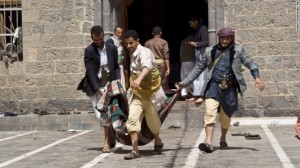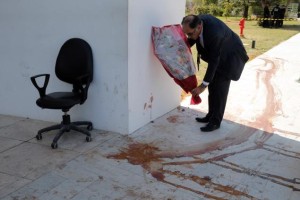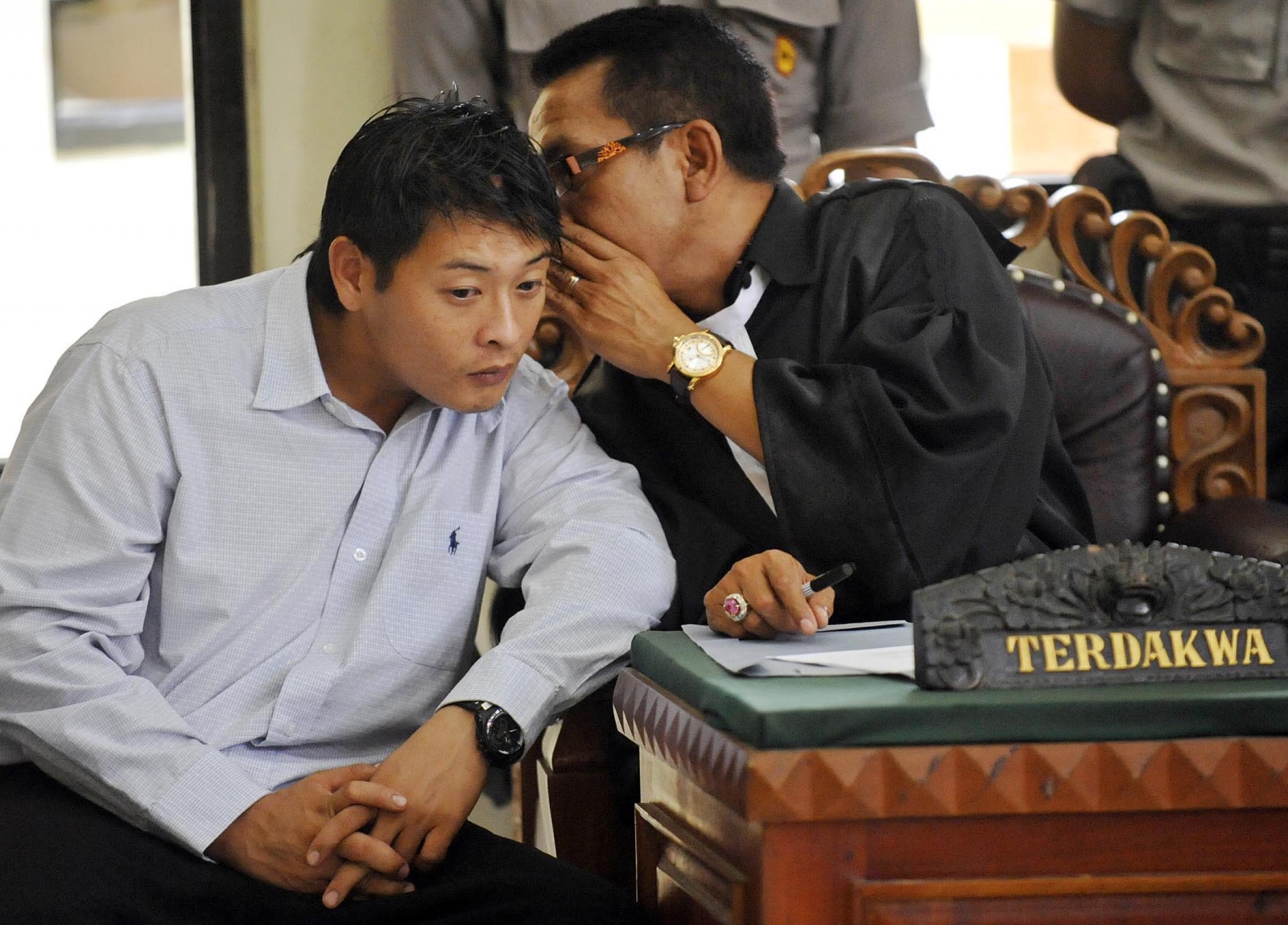https://impunitywatch.com/wp-content/uploads/2015/04/1425557372-English.pdf
By Ashley Repp
New Desk Reporter, Middle East
SANAA, Yemen-
As hundreds of Shi’ites gathered at two mosques in Sanaa, the capital of Yemen, for Friday prayer services, attackers blended into the scenery using medical casts to conceal explosives. The bombers within the mosques then detonated the bombs, killing scores of worshipers. As people fled the mosques, bombers stationed outside then detonated a second round of bombs amidst the fleeing crowd. The death toll has not been officially set, but the number of those dead is estimated to be at least 130, and there are over 300 hundred wounded. Hospitals were overwhelmed by the number of individuals rushed in for emergency care, and staff made a call for immediate donations of blood to accommodate the pressing need in the wake of the attacks.

While officials have not determined who is responsible for the attacks on the mosques, some point to ISIS, a Sunni extremist organization that considers the Shi’ite Houthi rebels to be heretics. Supporting this assertion, a twitter account that prominently features ISIS propaganda asserted that the mosque attacks were the first wave of attacks in Yemen. Some officials are skeptical that this was the work of ISIS, as the organization only recently set up in Yemen in November of 2014, and argued that, more realistically, this was the work of al-Queda in the Arabian Peninsula (AQAP). AQAP has denied these allegations though, and asserts that it was given orders to refrain from attacking mosques and markets.
If this attack was indeed orchestrated by ISIS, it represents the ever growing concern that ISIS is expanding its reach quickly and effectively, and has the capacity to incite world wide security concerns. Compounding the concern, the attack in Yemen on Friday follows just on the heels of a terror attack in a Tunisian museum on Wednesday, for which ISIS also claimed responsibility. If ISIS continues to develop a stronghold in Yemen, the already precarious civil situation between Sunnis and Shi’ite Houthi rebels, could be further deteriorate and evolve into a civil war.
For more information, please visit:
BBC- Yemen Crisis: Islamic State claims Sanaa mosque attacks– Mar. 20, 2015
Al Jazeera- Scores killed in suicide attacks on Yemen mosques– Mar. 21, 2015
CNN- Yemen: Bombs kill 137 at mosques; ISIS purportedly lays claim– Mar. 20, 2015
By Ashley Repp
News Desk Reporter- Africa
TUNIS, Tunisia
Many Tunisians are in a state of shock as they attempt to process the terror attack at the Bardo Museum on Wednesday afternoon that left a reported 25 people dead. Scores of people have taken to the streets to protest the terror attack, in an effort to defend the fragile democracy, which saw its first democratically elected president in December. The protesters carried signs condemning terrorism, asserting that terrorism is not representative of Tunisia or of Islam.

Two of the attackers were killed during the siege by police, but little is known about the individuals, or who is ultimately responsible for the operation. ISIS has reportedly claimed responsibility for the attack; just prior to the attacks, an ISIS supporter tweeted “Coming good news to Tunisia’s Muslims.” ISIS has supporters in Algeria and an active presence in Libya. Tunisia, one of the region’s only democracies, lies geographically between Algeria and Libya, which makes it susceptible to ISIS activity and influence, as well as a target for operations aimed at disrupting democracy. Also problematic, thousands of Tunisians have already gone to Iraq and Syria to join ISIS. One of the two attackers killed had reportedly gone to Libya to receive training.
The attack will likely have a resounding impact on the tourism economy. Once a tourist destination, Tunisia had seen a substantial decline in tourism to the country, and only recently did the industry begin to grow again. Following Wednesday’s attack, some cruise companies have already decided to remove Tunisia from the list of countries their ships will stop at. The economic implications of the attack are likely to reveal themselves in the coming months if tourists decide to avoid Tunisia for safety concerns.
Photos taken from the scene reveal the gruesome nature of the attack. Blood from those slain by the attackers remained on the ground, congealing in the sun and heat. Those killed were predominantly tourists from cruise ships, and were visiting the Bardo Museum and Tunis for the day. Inside the museum, one staff member heard the gunfire and immediately ushered tourists in that wing into a room and shut the door, venturing out after the gunfire subsided.
Many expressed their shock and disbelief that such an attack could happen at the Bardo Museum, which is just steps away from Parliament. President Beji Caid Essebsi called on Tunisians to unite in the face of terror, asserting that “we won’t win if we don’t stand together.” Tunisians seem to be uniting under this call and protesting against extremism and terror.
For more information, please visit:
BBC News- Tunis museum attack: President urges unity to fight terror– Mar. 20, 2015
The Washington Post- Tunisia rampage raises new fears about reach of Islamic State groups– Mar. 19, 2015
The Guardian- Troops patrol streets of Tunis in aftermath of terror attacks– Mar. 19, 2015
Time- Tunis reels from a terror attack possibly linked to ISIS– Mar. 20, 2015
By Max Bartels
Impunity Watch Reporter, Oceania
Jakarta, Indonesia
The Indonesian government has postponed the executions of 10 prisoners convicted of drug smuggling charges. The government has postponed the executions to deal with the appeals of several of those scheduled to be executed; the government claims the appeals could take months to work through. The Indonesian government has been under significant pressure by the international community to halt its practice of executing those who are convicted of drug smuggling charges. The President of Indonesia declared narcotics a “national emergency” and imposed a death penalty in Indonesia, which hasn’t been used since 2013 in any criminal case.

In January Indonesia executed five foreign citizens who were convicted of drug smuggling charges in Indonesia. Since then, two Australian citizens have been sentenced to death for smuggling heroin as part of the “Bali Nine” drug smuggling organization. The two Australians, named Andrew Chan and Myuran Sukumaran argue that they are reformed and have expressed remorse for the crime as well as argue they have been model prisoners.
Both men appealed to the President for clemency to halt their executions. The President rejected their appeals and the executions were scheduled to continue as planned. Government officials claim that there are no avenues under Indonesian law to appeal the Presidents decision on a clemency appeal. However, the defense attorneys claims that the President did not actually read the case files of the two men before he rejected their appeals. The lawyers for Chan and Sukumaran have until March 25th to prepare their argument and submit evidence to challenge the president’s rejection of their earlier clemency appeal, with March 30th being the day the defense is scheduled to present their case.
In addition to the two Australian citizens there are several other foreign prisoners who have been sentenced to death that are attempting to appeal their sentences and convictions. Two Nigerian prisoners are also appealing the President’s clemency rejection, as well as a French citizen and Ghanaian citizen who are asking the Indonesian Supreme Court to review their convictions. Indonesian officials have expressed concerns over the timing of the executions. If all the executions are not carried out simultaneously it would create further problems for the government, the executions must now wait until the appeals of all the convicts are resolved before any of the executions can move forward.
For more information, please see:
The NY Times — Indonesia Postpones Drug- Case Executions Amid Legal Challenges — 19 March, 2015
ABC News — Indonesia Defers Execution of 10 Drug Traffickers — 18 March, 2015
The NY Times — Indonesia: Executions are Delayed — 18 March, 2015
 |
||
|
||